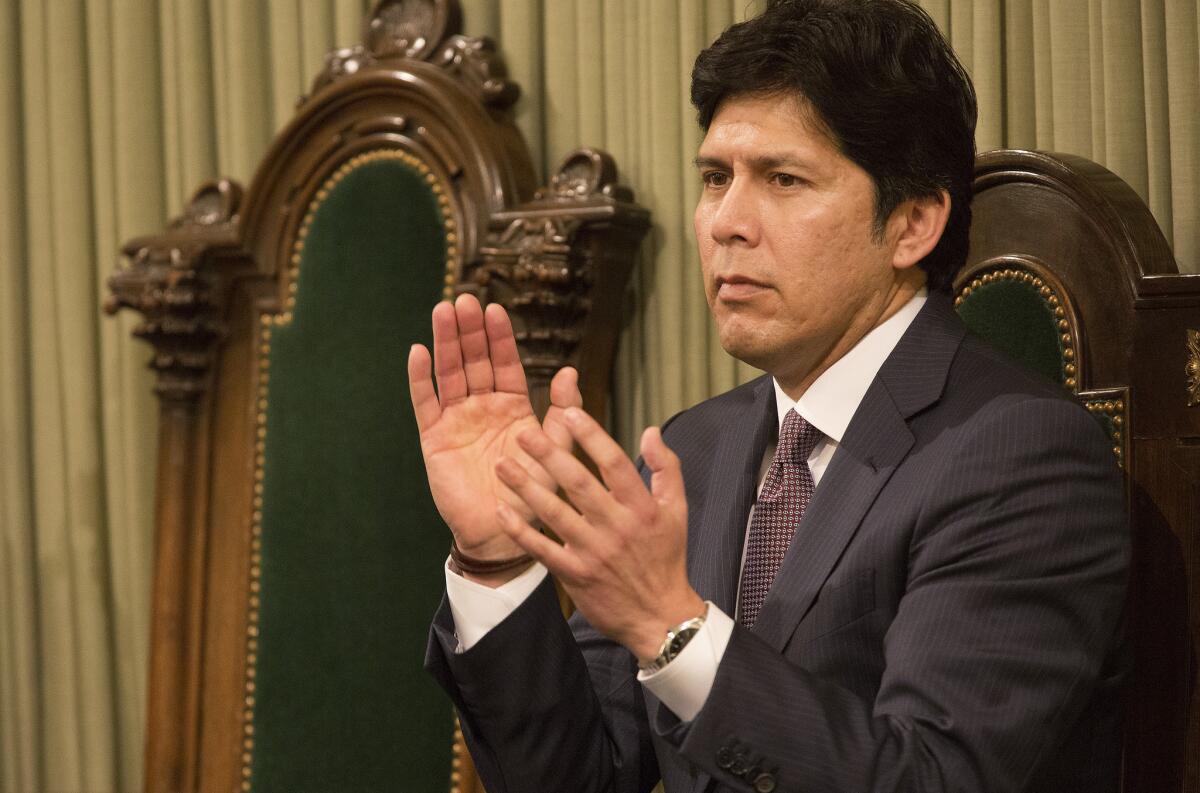Top state legislators raise concern about electric grid expansion

Senate President Kevin de Leon, above, joined Assembly Speaker Anthony Rendon in raising concerns about expanding the state electric grid to include PacifiCorp, one of the nation’s largest users of coal-fired power plants.
- Share via
California legislative leaders questioned Thursday a proposal to expand the electric grid to include one of the largest users of coal-fired power plants in the west.
In a letter to Gov. Jerry Brown, Senate President pro Tempore Kevin de León and Assembly Speaker-elect Anthony Rendon said they were concerned about bringing utility company PacifiCorp into a regional energy market with the California Independent System Operator, which manages the transmission of most of the state’s electricity.
------------
FOR THE RECORD
Feb. 5, 10:29 a.m.: An earlier version of this article incorrectly identified Senate President pro Tempore Kevin de León as the Senate president and Assembly Speaker-elect Anthony Rendon as the House speaker.
11:52 a.m.: An earlier version of this post incorrectly attributed certain statements about PacificCorp.’s and Berkshire Hathaway’s energy track record to the lawmakers; the statements should have been attributed to the Sierra Club.
------------
PacifiCorp operates in five western states, including Wyoming and Utah. The utility is owned by Berkshire Hathaway Energy, billionaire Warren Buffett’s utility holding company.
Join the conversation on Facebook >>
The lawmakers said the proposal to add PacifiCorp to California’s energy market could hurt the state’s efforts to address climate change and expand clean energy. In 2015, California increased its goals for generating electricity from renewable sources such as solar and wind to 50% by 2030.
“The proposed regionalization must not undermine state sovereignty or cede authority of our state’s cutting edge clean energy and climate policies to others who do not have the same strong commitment and legal framework to reduce climate pollution and promote clean energy,” the letter states.
De León and Rendon were joined on the letter by the chairmen of the state Senate and Assembly energy, utility and natural resources committees.
Bob Gravely, a PacifiCorp spokesman, said the lawmakers’ letter raises “lots of good questions” and the utility believes it will have solid answers for them. Gravely said the regional approach should strengthen California’s clean energy mandates.
“Coal power would be disadvantaged,” Gravely said. “This is a way to reduce the use of coal overall and increase use of renewables.”
In April 2015, the California Independent System Operator and the investor-owned utility PacifiCorp announced they had entered into a memorandum of understanding to explore the feasibility, costs and benefits of PacifiCorp joining the nonprofit as a participating transmission owner
From 2005 to 2010, PacifiCorp spent $1.2 billion on its coal plants, and its most recent long-range plan included more than $1 billion in additional spending on its coal plants through 2023.
In Oregon, state regulators have penalized PacifiCorp $17 million as a result of its failure to “reasonably examine alternative courses of action and perform adequate analysis to support its investments.”
The Sierra Club issued a news release about the lawmakers’ letter, calling PacifiCorp “the largest owner of dirty, outdated coal-fired power plants in the west.”
“California,” the Sierra Club said, “is a leader in government action to address climate disruption and expand clean energy at the state and local level. The proposal to develop a regional energy market with PacifiCorp could relinquish our control over state clean energy policies and undermine our leadership on climate change by giving new life to coal plants in the west.”
For more energy news, follow Ivan Penn on Twitter: @ivanlpenn.
ALSO
L.A. leaders want someone overseeing oil operations in the city full time
Klamath River dams moving toward removal despite congressional barriers
County supervisor wants more time for Porter Ranch residents to return home after gas leak
More to Read
Inside the business of entertainment
The Wide Shot brings you news, analysis and insights on everything from streaming wars to production — and what it all means for the future.
You may occasionally receive promotional content from the Los Angeles Times.











